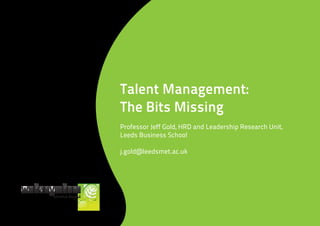Talent Mangement: The Bits Missing
- 1. Talent Management: The Bits Missing Professor Jeff Gold, HRD and Leadership Research Unit, Leeds Business School j.gold@leedsmet.ac.uk
- 2. Talent Management: The Bits Missing Professor Jeff Gold, HRD and Leadership Research Unit, Leeds Business School C1 C3 C2 A2 A1 B1 Telephone: 01535 604026 marketing@webanywhere.co.uk www.webanywhere.co.uk
- 3. Talent Management: The Bits Missing Professor Jeff Gold, HRD and Leadership Research Unit, Leeds Business School Telephone: 01535 604026 marketing@webanywhere.co.uk www.webanywhere.co.uk
- 4. Talent Management: The Bits Missing Professor Jeff Gold, HRD and Leadership Research Unit, Leeds Business School Telephone: 01535 604026 marketing@webanywhere.co.uk www.webanywhere.co.uk
- 5. Talent Management: The Bits Missing Professor Jeff Gold, HRD and Leadership Research Unit, Leeds Business School CIPD Surveys 54% of respondents reported doing talent management in 2012 (61% in 2011) Only 20% had a formal definition, less than 60% of organisations with talent management activities believe they are effective, with nearly one in six (15%) reporting they are ineffective Developing high potentials (67%) and senior managers (62%) are main targets In-house development, coaching and succession planning are main activities 66% believed that the exclusive focus had strong de-motivating effects on those not chosen Only 29% believed that talent management should have an exclusive focus Telephone: 01535 604026 marketing@webanywhere.co.uk www.webanywhere.co.uk
- 6. Talent Management: The Bits Missing Professor Jeff Gold, HRD and Leadership Research Unit, Leeds Business School Typology of TM Choices Inclusive Everyone Networks/Communities Collective Individual Selectes Elite Key positions/Key groups Exclusive Telephone: 01535 604026 marketing@webanywhere.co.uk www.webanywhere.co.uk
- 7. Talent Management: The Bits Missing Professor Jeff Gold, HRD and Leadership Research Unit, Leeds Business School Problems Talent matters, but TM matters more? Talent requires opportunity & direction Varied responses of different business units where culture, history and current imperatives mediate attitudes towards TM Leadership, structure, culture important – line managers!! Another performance and appraisal process which provided a totem of respectability Human Capital v Social Capital Development - talenting – the process of talent exchange for mutual benefit (or not) Telephone: 01535 604026 marketing@webanywhere.co.uk www.webanywhere.co.uk
- 8. Talent Management: The Bits Missing Professor Jeff Gold, HRD and Leadership Research Unit, Leeds Business School Focus solely on Individual Talent/Human Capital Neglects the organization as a whole Arrogance and elitism Talent not fixed over time Focus on hiring outsiders at expense of developing insiders Talented people recruit in own image, restricting what counts as talent Focus on individual leadership, hero worship and executive pay – creates narcissism, over-reliance on financial incentives and ruthlessness Telephone: 01535 604026 marketing@webanywhere.co.uk www.webanywhere.co.uk
- 9. Talent Management: The Bits Missing Professor Jeff Gold, HRD and Leadership Research Unit, Leeds Business School The need for Talenting Formal TM architecture - BOXES - GRIDS - PIPELINES Telephone: 01535 604026 marketing@webanywhere.co.uk www.webanywhere.co.uk
- 10. Talent Management: The Bits Missing Professor Jeff Gold, HRD and Leadership Research Unit, Leeds Business School Do You Know Your Talenting? 1 Which talenting activities are well known to you? 2 Which are known but difficult to specify in detail? 3 Is the talenting aligned? 4 Can you ever know all the talenting? Telephone: 01535 604026 marketing@webanywhere.co.uk www.webanywhere.co.uk
- 11. Talent Management: The Bits Missing Professor Jeff Gold, HRD and Leadership Research Unit, Leeds Business School Talenting-Based View of Business The sum of people’s gifts, and relationships of exchange, has the potential to create competitive advantage. Exploits the distinctive competencies of a work organisation (its resources and capabilities) that arise through exchange. Leadership capabilities are critical to harnessing the firm’s talenting Telephone: 01535 604026 marketing@webanywhere.co.uk www.webanywhere.co.uk
- 12. Talent Management: The Bits Missing Professor Jeff Gold, HRD and Leadership Research Unit, Leeds Business School Uncovering the Difference that Makes the Difference We have the Talent for Success Factor 1 Factor 3 Factor 2 Activity 1 Activity 4 Activity 2 Activity 3 Example 1 Example 2 Example 3 Story Story Story Telephone: 01535 604026 marketing@webanywhere.co.uk www.webanywhere.co.uk
- 13. Talent Management: The Bits Missing Professor Jeff Gold, HRD and Leadership Research Unit, Leeds Business School The Parable of the Talents* (Matthew 25:14-30) *From Latin talenta, plural of talentum sum of money; in Medieval Latin the sense was extended to ability “ For it will be like a man going on a journey, who called his servants and entrusted to them his property. To one he gave five talents, to another two, to another one, to each according to his ability. Then he went away. He who had received the five talents went at once and traded with them, and he made ” five talents more. So also he who had the two talents made two talents more. Telephone: 01535 604026 marketing@webanywhere.co.uk www.webanywhere.co.uk
- 14. Any Questions?













